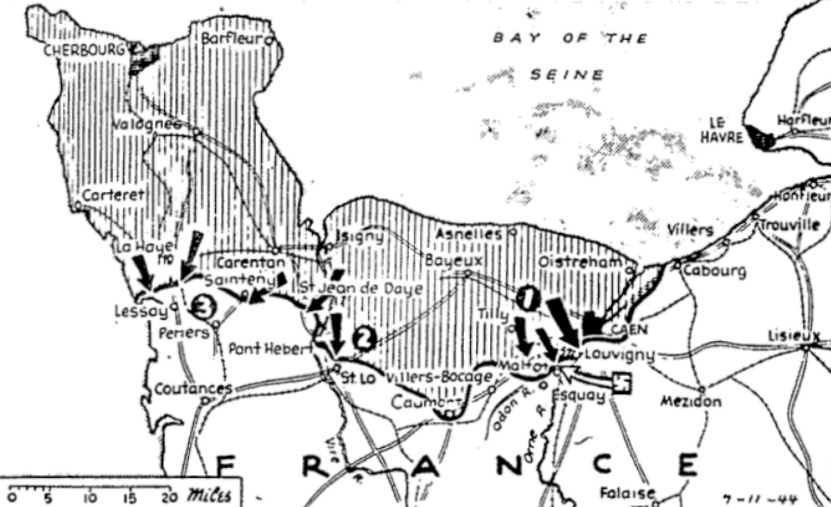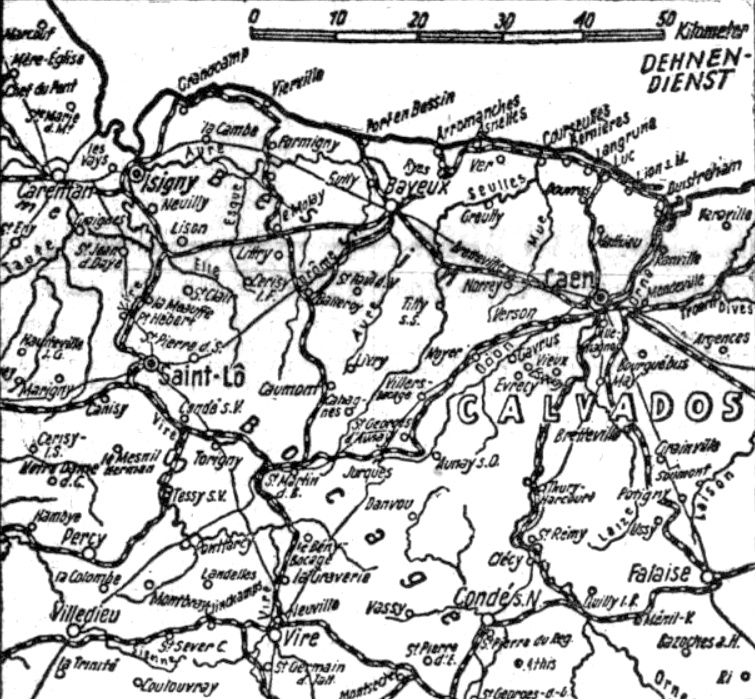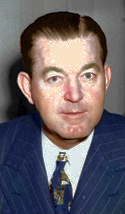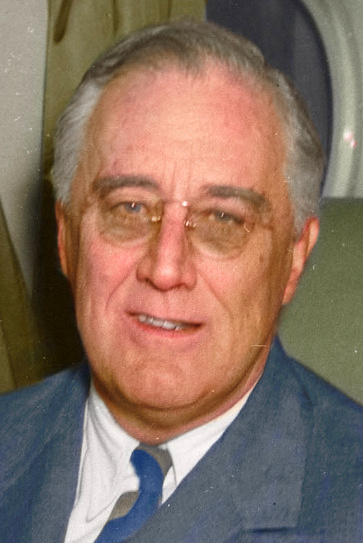NAZIS FALL BACK IN FRANCE
Yanks driving on transport hub of Saint-Lô
Canadians reach Orne below Caen
By Virgil Pinkley, United Press staff writer

Yanks opened a new offensive in Normandy today as the Canadians drove to the Orne River below Caen. The British fell back from Maltot but continued to advance toward the Orne in other areas as a big tank battle raged (1). The new U.S. offensive toward Saint-Lô (2) gained several hundred yards. South of La Haye-du-Puits, the Americans cleared out a forest on the road to Lessay and to the east advance from captured Sainteny (3).
SHAEF, London, England –
U.S. troops hit the center of the Normandy line today and plunged to within two miles of the big transport hub to Saint-Lô, field dispatches reported, and to the east, the Canadians drove an armored spearhead to the Orne River below Caen.
Pressure by U.S., British and Canadian forces on Marshal Erwin Rommel’s do-or-die line was beginning to bear fruit, and the Germans were slowly giving ground at both ends and in the middle.
Lt. Gen. Omar N. Bradley sent his U.S. assault forces over the top north of Saint-Lô in a new attack aimed at the core of the transport network below the Cherbourg Peninsula, and was reported in dispatches to have scored initial gains of several hundred yards.
Beginning to sag
At numerous points between La Haye-du-Puits and Caen, the Nazi line was beginning to sag, but the fighting everywhere was extremely fierce and the enemy was yielding ground only when he had no alternative.
U.S. forces captured six towns and villages scattered along the western part of the Normandy front, and at the eastern end of the line, the British and Canadians seized two more to bring the prongs of the arc thrown around the area of captured Caen to within four miles of junction below the big inland port.
Early this morning, British forces east of Caen hammered out a “most satisfactory” advance of about one mile, capturing the industrial suburbs of Colombelles and coming within four miles of the Canadian spearhead driven through Louvigny to the west bank of the Orne.
Desperate Nazi thrusts
“Extremely fierce and bitter fighting” was still going on below Caen. The Germans counterattacked repeatedly in the Orne–Odon corridor, throwing everything they had into futile attempts to recapture vital Hill 112 and the road junction a mile to the northeast.
After capturing Louvigny, two miles southwest of Caen, the Canadians consolidated their positions along the west bank of the Orne to a point northeast of Maltot.
To the west, the Americans made “substantial advances” in expanding their bridgehead across the Vire above Saint-Lô, headquarters reported. No word was forthcoming here on the new attack by the Americans, aimed at Saint-Lô from two directions, according to reports from the front.
In the Vire bridgehead sector, the Americans captured the villages of Hauts du Verney and Le Mesnil-Angot, as well as the hamlet of La Raoulerie, about three miles north of Saint-Lô. They had been unable to advance beyond Le Désert and Pont-Hébert, northwest of Saint-Lô, according to the latest advices here.
Dougald Werner, United Press staff writer at a Thunderbolt base in Normandy, reported that 9th Air Force fighter-bombers broke up two concentrations of German tanks moving northward toward the battlefront in the Saint-Lô area.
One squadron assigned to attack a strongpoint northwest of Saint-Lô spotted a number of tanks and destroyed 13 and damaged three.
Southwest of Carentan, U.S. forces widened their positions to the west and south, reaching a point a mile beyond Sainteny. East of the Carentan–Périers road, the Americans were held up south of a woods known as the Bois de Grinot and the village of La Corbinière.
On the western flank, the Americans completed the conquest of high ground in the Mt. Castre Forest below La Haye-du-Puits, reaching the southern slopes.
They pushed some 800 yards down the road from La Haye to Lessay and captured the village of Mobecq, two and a half miles southeast of La Haye.
German Marshal Erwin Rommel threw nearly 100 German tanks, including some 60-ton Tigers, into futile attempts to smash the British threat to his flank below Caen yesterday and all signs indicated that he was using his reserves at a rate that may cost him the Battle of France.
The Nazi-controlled Vichy radio said British patrols reached the Orne River, but later withdrew. The fighting south of Caen has developed into a “great battle which is now raging with fury,” the broadcast said.
15 towns captured
Though stiff German resistance slowed the British advance, the U.S. 1st Army captured 15 towns and villages in advances of up to a mile and a half yesterday on the central and western sectors of the 111-miles Normandy front.
The Americans seized Pont-Hébert and La Meauffe, four miles northwest and five miles north of Saint-Lô, advanced down the Carentan–Périers highway to within 4¾ miles northwest of Périers, and gained a mile and a half on a half-mile-wide front south of La Haye-du-Puits.
A dispatch from 1st Army headquarters in Normandy said the Americans were meeting little or no resistance in their advance west of the La Haye–Lessay road, the first report of a voluntary enemy retreat since the start of the American phase of the offensive a week ago yesterday.
Gen. Dwight D. Eisenhower’s communiqué said the fighting was “particularly severe” between the Odon and Orne rivers south and southwest of Caen with the enemy “hotly contesting” the British advance to high ground overlooking the Orne.
Determined Nazi attack
Samuel D. Hales, United Press staff writer with the 2nd Army, said the British pulled out of Maltot, captured only yesterday, and took up a new line along the Esquay–Caen road during the night in the face of determined enemy counterattacks.
The British held firmly to Hill 112 overlooking the Orne, however, and Ronald Clark, another United Press staff writer with the 2nd Army, reported that Lt. Gen. Sir Miles C. Dempsey’s forces were working their way down the slopes of the hill toward the river despite a hail of enemy artillery and mortar shells from the opposite bank.
Another front dispatch said waves of German infantry attacked Hill 112 last night and, in some sections, reached Allied gun positions, but were finally driven off after an hour and a half of close-quarters fighting. Many German dead remained on the slopes of the hill.
Murky weather continued to ground the Allied air forces, preventing air support that might turn the tide of battle if unleashed in full fury.





